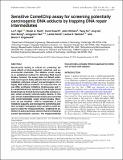Sensitive CometChip assay for screening potentially carcinogenic DNA adducts by trapping DNA repair intermediates
Author(s)
Ngo, Le P; Owiti, Norah A; Su, Yang; Ge, Jing; Han, Jongyoon; Samson, Leona D; Engelward, Bevin P; ... Show more Show less
DownloadPublished version (1.350Mb)
Publisher with Creative Commons License
Publisher with Creative Commons License
Creative Commons Attribution
Terms of use
Metadata
Show full item recordAbstract
Genotoxicity testing is critical for predicting adverse effects of pharmaceutical, industrial, and environmental chemicals. The alkaline comet assayis an established method for detecting DNA strandbreaks, however, the assay does not detect potentially carcinogenic bulky adducts that can arise whenmetabolic enzymes convert pro-carcinogens into ahighly DNA reactive products. To overcome this, weuse DNA synthesis inhibitors (hydroxyurea and 1-β-d-arabinofuranosyl cytosine) to trap single strandbreaks that are formed during nucleotide excision repair, which primarily removes bulky lesions. In thisway, comet-undetectable bulky lesions are convertedinto comet-detectable single strand breaks. Moreover, we use HepaRG™cells to recapitulatein vivometabolic capacity, and leverage the CometChip platform (a higher throughput more sensitive comet as-say) to create the ‘HepaCometChip’, enabling the detection of bulky genotoxic lesions that are missed bycurrent genotoxicity screens. The HepaCometChip thus provides a broadly effective approach for detection of bulky DNA adducts.
Date issued
2019-12-11Department
Massachusetts Institute of Technology. Department of Biological Engineering; Massachusetts Institute of Technology. Department of Biology; Massachusetts Institute of Technology. Department of Electrical Engineering and Computer ScienceJournal
Nucleic Acids Research
Publisher
Oxford University Press (OUP)
Citation
Ngo, Le P. et al. “Sensitive CometChip assay for screening potentially carcinogenic DNA adducts by trapping DNA repair intermediates.” Nucleic Acids Research 48 (2020): e13 © 2020 The Author(s)
Version: Final published version
ISSN
0305-1048
1362-4962
Keywords
Genetics